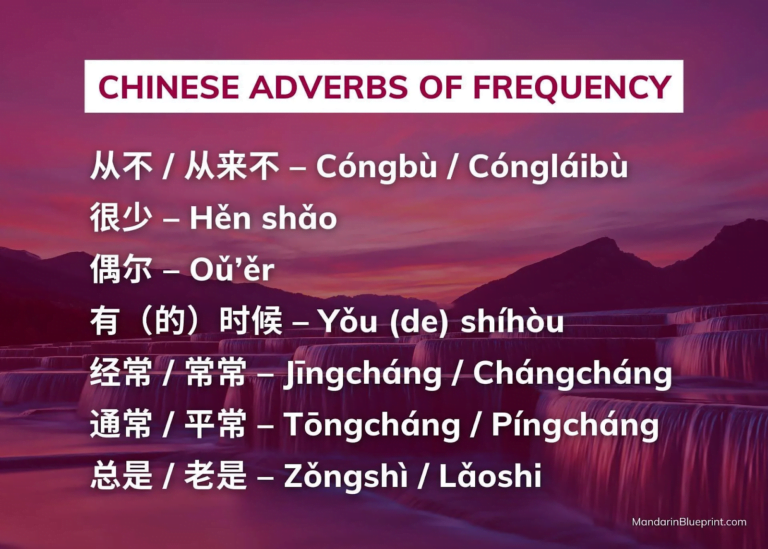Understanding Chinese Adverbs of Frequency

The major Chinese adverbs of frequency provide information about the regularity or frequency of an occurrence or action. Unlike adverbs of time that specify “when”, frequency adverbs answer “how often” something happens. They’re crucial in Mandarin for conveying the regularity of actions and events.
Adverbs of frequency are particularly useful in Mandarin for discussing habits, routines, or tendencies. Their use can provide insights into the regularity of actions, which is an important aspect of everyday conversation and storytelling. Their correct usage is fundamental to accurately conveying routines, habits, and frequencies and is a key aspect of effective communication in Mandarin. Let’s look at some of the Chinese adverbs of frequency you’re likely to come across.

从不 (Cóngbù) / 从来不 (Cóngláibù)
Both 从不 (Cóngbù) and 从来不 (Cóngláibù) are negative frequency adverbs used to express that something never happens. They’re essential in Mandarin for stating the absolute absence of an action or event over time.
These phrases are generally interchangeable with no significant difference in meaning. However, there might be slight nuances in use based on context or emphasis. For example, 从来不 (Cóngláibù) might be used for emphasis in some contexts due to its slightly longer form.
In keeping with Mandarin’s sentence structure, both 从不 and 从来不 typically precede the verb or verb phrase. For instance, in “我从来不说假话” (Wǒ cóngláibù shuō jiǎhuà — “I never tell lies”), 从来不 is placed before the verb 说假话 (shuō jiǎhuà — “tell lies”).
These adverbs are used to express a strong, absolute negation over time. They’re useful in making definitive statements about habits, characteristics, or actions that don’t occur at all.
Compared to other frequency adverbs like 常常 (chángcháng — “often”) or 有时 (yǒushí — “sometimes”), 从不 and 从来不 represent the extreme end of the frequency spectrum, indicating the complete non-occurrence of an action.
It should be clear that both 从不 (Cóngbù) and 从来不 (Cóngláibù) are important negative frequency adverbs in Mandarin Chinese. They are crucial in expressing absolute negation of actions or events over time. Their proper use within the structure of Mandarin sentences helps to convey clear and strong statements regarding the absence of certain actions or habits.
Related Reading: 120 Basic Chinese Words and Phrases to Help You Survive
很少 – Hěn shǎo
The Chinese adverb 很少 (Hěn shǎo) is used to indicate that an action or event occurs rarely or infrequently. It serves a critical role in Mandarin for expressing a low frequency of occurrence, positioned on the frequency scale between occasionally and never.
很少 is commonly used in sentences to express that something happens seldom or not often. For example, in “我很少有时间看电影” (Wǒ hěn shǎo yǒu shíjiān kàn diànyǐng — “I rarely have time to watch a movie”), 很少 modifies the phrase 有时间看电影 (yǒu shíjiān kàn diànyǐng — “have time to watch a movie”), indicating the infrequency of the action.
As an adverb, 很少 is particularly useful for expressing that an action or event isn’t a regular part of one’s routine or occurs only under specific or limited circumstances. It helps in conveying nuances related to sporadic or occasional activities.
The use of 很少 in Mandarin reflects the language’s capacity to convey subtle differences in frequency and routine. This Chinese adverb is essential for detailed and precise communication, especially in contexts where the rarity or infrequency of actions is significant.
偶尔 – Oǔ’ěr

This one is a bit harder to translate into English, as it’s used very generally in China. 偶尔 (Ǒu’ěr) is used to indicate that an action or event happens on an irregular, infrequent basis. While it’s often translated as “occasionally” or “sometimes,” its use in Mandarin can cover a wide range of frequencies, from fairly regular to quite sparse.
The interpretation of 偶尔 can also vary significantly based on context. For instance, “我们偶尔见面” (Wǒmen ǒu’ěr jiànmiàn — “We see each other once in a while”) might mean meetings happen sporadically, with no set pattern, ranging from monthly encounters to meetings every few years. This variability makes 偶尔 a particularly nuanced and context-dependent adverb.
偶尔 typically precedes the verb or verb phrase it modifies. Its placement is key to the sentence’s meaning, providing a clear indication of the frequency of the action, and it allows Mandarin speakers to convey the idea that an action happens, but not with any regularity or predictability.
So 偶尔 (Ǒu’ěr) serves as an important and flexible Chinese adverb of frequency. It’s key to expressing occasional or sporadic actions or events, and it provides Mandarin speakers with a nuanced way to describe irregular frequencies. Proper understanding and use of 偶尔 are vital for conveying the varied and often context-dependent nature of certain activities or habits.
Related Reading: Is Chinese Hard to Learn?
有(的)时候 — Yǒu (de) shíhòu
有(的)时候 (Yǒu (de) shíhòu) translates to “sometimes” in English and is used to indicate occurrences that happen occasionally but without a specific or regular pattern. This phrase captures the vagueness and flexibility inherent in the concept of “sometimes.”
The phrase can be used either as 有的时候 (Yǒudeshíhòu) or 有时候 (Yǒushíhòu), with the latter seeing 候 (hòu) pronounced in a neutral tone. The meaning remains the same in both cases, with the choice often down to personal preference or speech rhythm.
In Mandarin sentences, 有(的)时候 usually appears at the beginning of a sentence or clause, setting the stage for the description of an occasional action or event. For example, in the sentence “有的时候,我们学校会在周六早上开设额外的语言课” (Yǒudeshíhòu, wǒmen xuéxiào huì zài zhōuliù zǎoshang kāishè éwài de yǔyán kè — “Sometimes, our school opens for extra language lessons on Saturday mornings”), it introduces the context of occasional occurrence.
This phrase is particularly useful for discussing activities or events that occur from time to time but not according to a fixed schedule or regular pattern. It’s a versatile adverbial phrase for discussing habits, routines, or occurrences in a non-specific manner.
The use of 有(的)时候 (Yǒu (de) shíhòu) serves as an important and flexible adverb of frequency in Chinese, allowing speakers to express occasional or sporadic occurrences with a degree of vagueness. Its correct usage is vital for discussing activities or events that do not adhere to a regular pattern, enhancing the expressiveness of Mandarin communication.
经常 / 常常 — Jīngcháng / Chángcháng

Both 经常 (Jīngcháng) and 常常 (Chángcháng) are used to indicate that an action or event occurs frequently. They’re important in Mandarin for expressing regularity or habitual occurrence.
While these two adverbs are largely interchangeable and have the same meaning, there can be subtle nuances in their use based on context or personal preference. For instance, some speakers might use 经常 for slightly more formal or written contexts, but this isn’t a strict rule.
These Chinese adverbs are particularly useful for discussing habits or routines. They allow Mandarin speakers to convey that an action is a regular part of one’s life or occurs frequently.
Understanding 经常 and 常常 in relation to other frequency adverbs like 偶尔 (ǒu’ěr — “occasionally”) or 很少 (hěn shǎo — “rarely”) is important for accurately conveying the frequency of actions in Mandarin. While 经常 and 常常 indicate a high frequency, 偶尔 and 很少 suggest lower frequencies.
经常 (Jīngcháng) and 常常 (Chángcháng) are crucial adverbs of frequency in Mandarin Chinese, used to express that an action occurs often. Their interchangeable use and proper placement within Mandarin sentences are vital for conveying habitual or frequent actions.
Related Reading: Best Way to Learn Mandarin By Yourself: 15 Essential Tips
通常 / 平常 – Tōngcháng / Píngcháng
Although they look and sound very different, 通常 (Tōngcháng) and 平常 (Píngcháng) are both used to convey a sense of normalcy or regularity. They translate to “usually” or “normally” in English and are used to describe what typically or generally happens.
Both adverbs are used to describe regular or habitual occurrences, and they can often be used interchangeably. However, 通常 might carry a slightly more formal tone or be more prevalent in written Chinese compared to 平常.
An important thing to remember is that while 通常 and 平常 indicate a general or usual occurrence, other Chinese frequency adverbs like 经常 (jīngcháng — “often”) may imply a higher frequency. Understanding these differences is crucial for accurately depicting the regularity of actions in Mandarin.
It’s clear that 通常 (Tōngcháng) and 平常 (Píngcháng) are important adverbs in Mandarin Chinese, used to express what is usual or typical. Their correct use and placement within written and spoken Mandarin sentences are vital for accurately conveying the regularity or normalcy of actions or events, enhancing the clarity and precision of Mandarin communication.
总是 / 老是 – Zǒngshì / Lǎoshi
The two Chinese adverbs 总是 (Zǒngshì) and 老是 (Lǎoshi) are both used to indicate that an action or event occurs all the time or with a very high frequency. They are key in Mandarin for expressing continual or habitual occurrences.
While 总是 is a more neutral term, simply indicating that something always happens, 老是 often carries a negative connotation, suggesting annoyance or frustration about the habitual nature of the action.
For example, 总是 is useful for stating a consistent, regular fact, while 老是 is often used to express frustration about a recurring problem or annoyance, as in “我哥哥上学老是迟到” (Wǒ gēgē shàngxué lǎoshi chídào — “My brother is always late for school”).
The distinction between 总是 and 老是 in Mandarin reflects the language’s capacity to convey subtle differences in frequency and attitude. This distinction is significant for effective communication, particularly when discussing habitual actions or behaviors.
Both 总是 (Zǒngshì) and 老是 (Lǎoshi) are important Chinese adverbs of frequency, used to express that an action occurs always or very frequently. Their correct use, particularly the nuanced use of 老是 for expressing negative connotations, is extremely important for accurately conveying the frequency and emotional context of actions or events in Mandarin.
Unlocking Fluency with Chinese Adverbs of Frequency
When you’re learning Mandarin, understanding and effectively using Chinese adverbs of frequency isn’t just a linguistic necessity but a gateway to cultural immersion. These adverbs are more than mere words; they’re the keys that unlock the nuances of daily communication and the rhythm of regular life in Mandarin-speaking contexts.
From expressing the absolute negation with 从不 (Cóngbù) and 从来不 (Cóngláibù) to indicating habitual occurrences with 经常 (Jīngcháng) and 常常 (Chángcháng), every adverb brings you closer to thinking and communicating like a native speaker.
Mandarin allows you to capture the subtleties of frequency and routine with precision. Whether it’s through the rare occurrences denoted by 很少 (Hěn shǎo), the sporadic nature of 偶尔 (Ǒu’ěr), or the general regularity conveyed by 通常 (Tōngcháng) and 平常 (Píngcháng), these adverbs of frequency enrich your speech, making it more vivid and authentic. They don’t simply convey facts. They paint pictures of habits, routines, and the ebb and flow of daily life.
But how do you take this knowledge and apply it to accelerate your Mandarin learning journey? How do you go from recognizing these adverbs to using them fluently in your conversations?
It’s time to take a decisive step towards fluency with our FREE Mandarin Fluency Scorecard. This isn’t just another language tool. It’s a personalized guide tailored to your unique learning journey. By completing the Mandarin Fluency Scorecard, you’ll gain insights into your current skill level and discover specific areas for improvement.
Imagine identifying your personal weaknesses and barriers to fluency in under a minute. Our customized guide offers you the next steps based on your current level, ensuring that your learning path is as efficient and effective as possible. You’ll receive a custom report with immediate action steps, empowering you to tackle Mandarin with renewed vigor and clarity.
Remember, this is more than just a learning aid; it’s a journey toward cultural and linguistic mastery. And the best part? It’s completely FREE and takes less than 60 seconds. Don’t let language barriers keep you from experiencing the richness of Mandarin. Complete your Mandarin Fluency Scorecard now and start your journey to fluency today.








